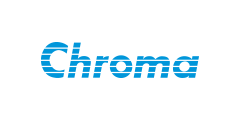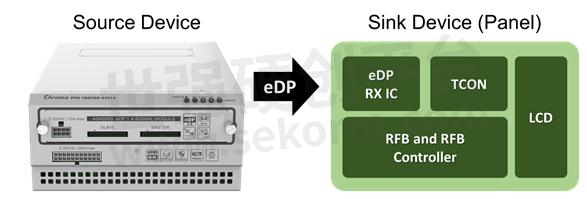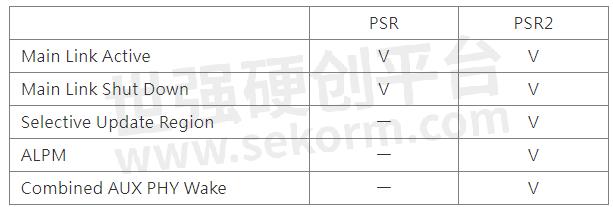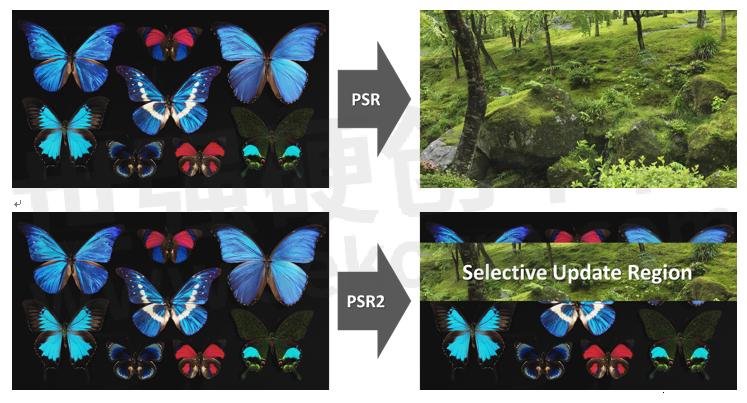Chroma Testing Solutions Including FPD Testers and Signal Modules Support eDP Interface PSR and PSR2 Testing

PSR (Panel Self Refresh) is a technology incorporated by the Video Electronics Standards Association (VESA) in its eDP (embedded DisplayPort) specification that is mainly used in notebooks, computers, tablets, and mobile devices. VESA's next-generation panel interface offers higher transmission rates than traditional interfaces and supports a thin and light design for embedded display panel applications. Additionally, its power-saving features for mobile devices enable extended use without worrying about battery life. The image below shows the eDP system architecture.

*PSR/PSR2 example application with CHROMA 27014 + A040205 eDP 1.4
*Remote Frame Buffer (RFB)
PSR: Power-Saving Technology
PSR technology mainly serves to reduce overall power consumption when the image on display is static. In applications where the on-screen content often stays still for extended periods, such as when reading an eBook, this function can effectively extend the battery life of the mobile device. To achieve this, both the transmitter and the receiver must support PSR. When the transmitter is continuously sending out static images, the receiver is alerted via the Main Link (which controls the image data). Then, after the images are stored in the receiver's Remote Frame Buffer (RFB) and displayed, the transmitter will stop sending image data in order to save power.
PSR2: Next-Generation Power-Saving Technology
The main difference between PSR and PSR2 lies in whether the display will be updated entirely or partially. PSR2 offers a "Selective Update" (or "partial update") feature that can pinpoint the portion of the screen that needs to be refreshed. The transmitter then instructs the receiver to refresh only the specified area. As a result, the graphics processor only needs to send a small amount of updated data. PSR2 also supports using Advanced Link Power Management (ALPM) to quickly wake the receiver from standby and sleep states.
PSR and PSR2 Function Comparison

The Chroma A040205 eDP 1.4 signal module and Chroma A291803 8.1G eDP Signal Module are designed according to the VESA eDP 1.4 and eDP 1.4a standards respectively. The A040205 module is compatible with the Chroma 27014 Flat Panel Display (FPD) tester, and the A291803 module is compatible with the Chroma 2918 FPD tester. Both testers come with FPD Master software that has PSR / PSR2 detection, can perform both full-display updates as well as partial updates, and include power management (ALPM) setup, providing users with an easy way to conduct functional verification.

The Chroma 27014 FPD tester paired with the A040205 eDP 1.4 signal module and the Chroma 2918 FPD tester paired with the A291803 8.1G eDP signal module both provide suitable testing solutions for panel makers, driver IC design, repair centers, PCB substrate test, automated testing equipment vendors, IC aging test, and product verification applications.
- +1 Like
- Add to Favorites
Recommend
- Chroma Launches Next-Generation High-Performance Power IC Test Platform Chroma 3650-S2 Equipped with up to 768 pins, 200Mbps data rate
- Chroma Regenerative Test Solutions Accelerate Net-Zero Transition
- Chroma ATE Showcases Advanced Test Technology to Propel the AI Revolution at SEMICON Taiwan 2023
- Sekorm Became an Official Authorized Distributor of Chroma
- Chroma ATE Inc. Featured in Forbes Asia‘s Best Under A Billion 2023, Showcasing Consistent Top- and Bottom-Line Growth
- 8610 Battery Pack Integrated Testbed for Testing New Energy Vehicle Battery Systems and Subparts | Chroma
- Chroma Test Setup for Complete Gamma Measurement on Video Signal Generators
- Chroma 62000d Programmable Bidirectional Dc Power Supplies Have Both Power Source and Load Characteristics
This document is provided by Sekorm Platform for VIP exclusive service. The copyright is owned by Sekorm. Without authorization, any medias, websites or individual are not allowed to reprint. When authorizing the reprint, the link of www.sekorm.com must be indicated.






























































































































































































































































































































































































































































































































































































































































































































































































































































































